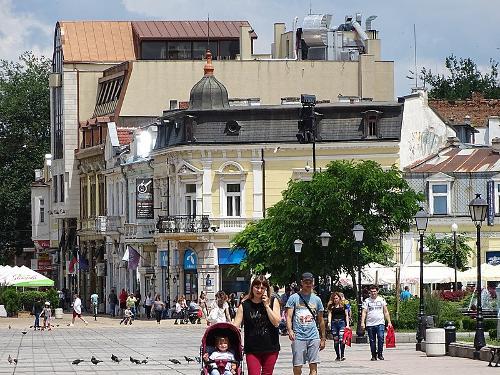BULGARIA
Population

Population
Cities in BULGARIA
| Sofia |
Population
 Bulgaria street scenePhoto: Adam Jones CC 2.0 Generic no changes made
Bulgaria street scenePhoto: Adam Jones CC 2.0 Generic no changes made
In 2024, Bulgaria had about 6,8 million inhabitants. This means that Bulgaria has an average of about 62 inhabitants per km2. In 2024, the population growth was –0.66%. About 77% of the population lives in cities, the largest of which are Sofia (1.3 million inhabitants), Plovdiv (340,000), Varna (334,000), Bourgas (200,000), Ruse (150,000), and Stara Zagora (148,000) . The rest of the population lives in the sparsely populated countryside.
The population consists mainly of Bulgarians (79%). The largest minority group is Turkish (7,8%) followed by the Roma (gypsies; 4.1%). Furthermore, small groups of Macedonians, Armenians, Romanians, Russians, Jews and Tatars still live in Bulgaria. The situation of the Turkish minority deteriorated in the course of the 1980s. In 1984 the Turks were forced to adopt a Slavic name. Large-scale intimidation techniques began in 1988, as a result of which hundreds of thousands of Turkish Bulgarians left the country and fled to Turkey. The number of Roma is probably higher, but for fear of discrimination, many Roma conceal their ethnic origin.
The Russians are mainly Russian men and women who married Bulgarian citizens after the Second World War. The Armenians mainly live in the capital Sofia and Plovdiv. The Macedonians are not officially recognized as a minority group by the Bulgarian government. Until the Second World War, more than 50,000 Jews lived in Bulgaria. Because there was hardly any anti-Semitism in Bulgaria, not one Bulgarian Jew was eventually deported to the German camps. The fact that there are now only about 4,000 Jews living in Bulgaria is due to the massive emigration to Israel that started after the Second World War.
The population structure is quite Western. The population between 0-14 years is 13.8%, between 15-64 years 65.2%, and 65 years and older 21%. (2024) The average life expectancy for women is approximately 79.4 years and for men approximately 72.9 years. (2024)
Sources
Berg, H. van den / Reis-handboek voor Bulgarije
Elmar
Detrez, R. / Bulgarije: mensen, politiek, economie, cultuur, milieu
Koninklijk Instituut voor de Tropen
Resnick, A. / Bulgaria
Childrens Press
CIA - World Factbook
BBC - Country Profiles
Copyright: Team The World of Info